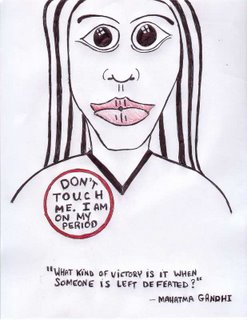
I try to educate others and myself, on cultural awareness issues, through the publishing of weekly cultural tips. I recently posted a tip on working with Israeli Orthodox Jews and the exchange of business cards (see below). Interestingly enough, I received a letter by a professional female in direct opposition of my tip. This individual was extremely offended. I am sharing her anonymous letter as an educational moment. I flash back to the quote, “You can please some of the people some of the time, but you can’t please all the people all the time” (Abraham Lincoln).
Do bigots actually live and thrive in today’s American and/or global society? It appears some cultures are not afforded the same rights as others. We are asked to be accepting of all, but it appears that the all is minus more than half of the worlds population (54% or 3 billion plus) the Jew, the Christian, and the Moslem.
Take away: Tolerance is for all, not some. This goes back to a simple policy of “Disagree and Commit.” We don’t have to like everything, but some things are cultural and not ours to change.
My Cultural Tip: If working in or visiting Israel, business cards should be printed in English letters on one side and Hebrew on the other. Typically, cards that are engraved are considered more prestigious. It is important to take your cue from your local counterpart as to when it is appropriate to exchange business cards. However, in the event that a business woman finds herself presenting her business card to an Orthodox Jew, she should place the card on the table in front of him. This is because Orthodox Jews are not supposed to accept anything that is directly handed to them by a woman.
Mike,
I want to let you know that I found the latest Cultural Tip, extremely offensive.
Yes, it may not be culturally acceptable for Orthodox Jews to accept a business card handed directly to them from a woman. However, I used to work for the American Jewish Committee in Seattle, and cannot imagine their female executive director or board members accommodating this custom when dealing with Israeli Orthodox colleagues. It is not acceptable in our culture to insinuate that women are unclean, or that American women working overseas should kowtow to sexist religious beliefs. Are American service women now going to have to adopt a burka to serve in Islamic countries?
I would appreciate an extension of cultural sensitivity to the women working here.
Signed Anonymous
This is my response:
Correct me if I am wrong, but I draw a conclusion of ethnocentrism and bigotry.
Hi Anonymous,
The tips are taken directly from a world source leader in global communication and cultural know-how. The cultural tips are definitely not meant to offend, but rather to bring about awareness of difference and hopefully, tolerance of another's customs and beliefs (right or wrong). As I have offended you, I apologize for the offense you have taken on the Working with Israel and Orthodox Jew business card exchange. However, I would love to hear from the American Jewish Committee Council women executives on their opinion of the cultural tip. The tip is referring more to a sensitivity of women and a respect for women, rather than a perception of being unclean or a second class citizen.
Here is what I wanted to ask but didn't: Would it be better if women wore buttons to announce their monthly cycle, I think not. What is the answer?
Take Note: In a great cultural book called "Kiss, Bow, or Shake Hands, states, "Israel is a democratic and egalitarian culture built on competition. The leveling and educational influences of general military service help to develop a sense of equality. Although there is inequality in roles, equal rights are guaranteed to all. (Morrison, Conaway, and Borden 1994)." Although, saying this, across the world there is still much work to be done on human rights, especially for women and other minority groups. Where in the world would we be without women? We would not have 6 billion people on Earth, without women, this is a fact.
A recent real life example: Today (July, 24, 2006) I attended an EEO/Diversity forum where a female Air Force Academy graduate and a U2 pilot discussed her feelings of being forced to wear the burka and the inability to drive a car alone in a Middle Eastern country. When I personally served in the military internationally, many of my female peers were put into the same uncomfortable cultural situation. Women are not afforded the choice of wearing the burka if they desire to leave the compound. Many times my women peers were offended, but they adhered to the cultural guidelines if they went off site.
Back to your response, in the U.S. customs are culturally different and the tip is not necessarily directed at interacting with US Orthodox Jews. An Orthodox Jew in the US will most likely accept a business card, or money exchange across genders. However, in Israel, the Orthodox Jew will most likely not reach for the card. A large percentage of Israeli Jews are secularists, which rarely observe the requirements of their faith. Many times cultures will make exceptions for a lack of cultural sensitivity of people they interact with.
Thanks for your feedback,
Mike
Please write and post a comment as I love dialogue!
 How true it is, Children have no choice…they have no voice!
How true it is, Children have no choice…they have no voice! 



















